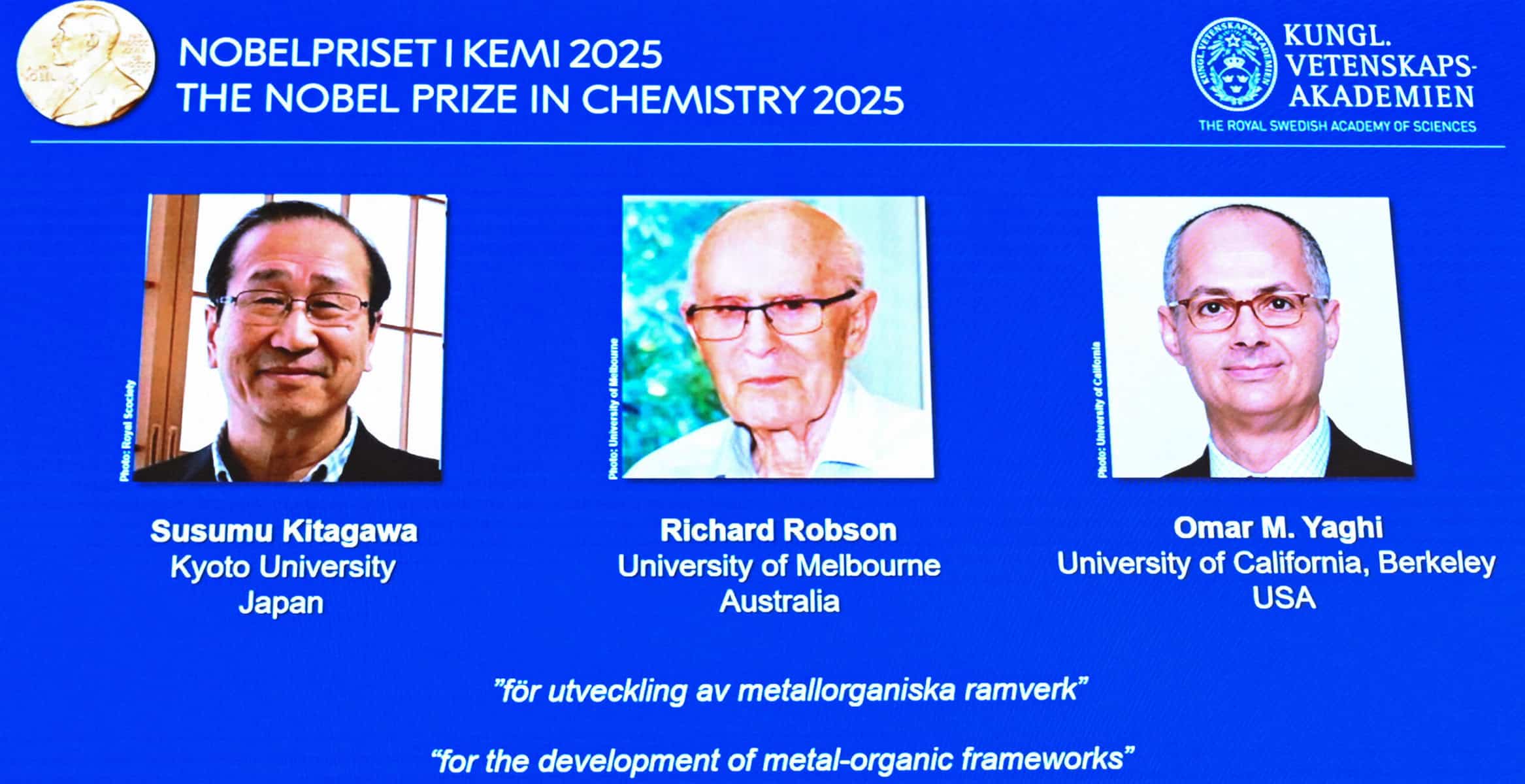Three chemists earn the 2025 Nobel for pioneering metal–organic frameworks, with applications from carbon capture to harvesting water in deserts.

Three scientists won the Nobel Prize for Chemistry Wednesday for their work developing metal–organic frameworks (MOFs), whose multiple uses include capturing carbon dioxide and harvesting water from desert air.
Japan’s Susumu Kitagawa, UK-born Richard Robson and American-Jordanian Omar Yaghi were honoured for their groundbreaking discoveries dating from the late 1980s to the early 2000s.
The jury noted that thanks to the trio’s discoveries, chemists had been able to build tens of thousands of different MOFs.
“Some of these may contribute to solving some of humankind’s greatest challenges,” it added.
It listed applications such as “separating PFAS from water, breaking down traces of pharmaceuticals in the environment, capturing carbon dioxide or harvesting water from desert air”.
To explain the scale of their achievement, Hans Ellegren, secretary general of the Royal Swedish Academy of Sciences, told reporters: “Imagine that the tools of chemistry could be used to create entirely new materials with unheard of properties.”
ALSO READ: Blood Moon to grace SA skies: Here’s when you can see it
‘Spacious crystal’
In 1989, Robson, 88, tested utilising the properties of atoms in a new way using copper ions.
“When they were combined, they bonded to form a well-ordered, spacious crystal,” the jury said. “It was like a diamond filled with innumerable cavities.”
Robson, a professor at the University of Melbourne, realised the potential of his discovery but the molecular construction was unstable.
It was Kitagawa, a professor at Kyoto University, and Yaghi, a professor at the University of California, Berkeley, who provided a “firm foundation” for the building method.
Between 1992 and 2003, working separately, they made a series of revolutionary discoveries.
Kitagawa “showed that gases can flow in and out of the constructions and predicted that MOFs could be made flexible,” said the jury.
ALSO READ: Sum-thing to worry about: Here’s the number of Grade 6 pupils failing maths in SA
Yaghi created “a very stable MOF” and showed that it could be modified using rational design, giving it new and desirable properties,” it added.
Yaghi’s humble beginnings
“I’m deeply honoured and delighted that my long-standing research has been recognised,” Kitagawa said as he was interviewed by phone during the prize announcement news conference.
In an interview with the Nobel Foundation, Yaghi said he was “astonished, delighted, overwhelmed” at the news he had won the award.
He was in an airport switching flights when the Academy called him to announce the news.
Born into a family of refugees in Amman, Jordan, Yaghi did not start out in ideal conditions to pursue an academic career.
“I grew up in a very humble home. And, you know, we were a dozen of us in one small room, sharing it with the cattle that we used to raise,” he said.
ALSO READ: Finding hope beyond the headlines
He said he thought his father had only finished sixth grade and that his mother could neither read nor write.
For Yaghi, school provided a refuge, the Royal Swedish Academy of Sciences said in its statement.
He had first discovered molecular structures in a book when he was 10 and had snuck into the usually locked school library, it added.
He moved to the US to study at the age of 15.
“So it’s quite a journey,” he mused — and science had allowed him to make it, he added.
“Science is the greatest equalising force in the world,” Yaghi said.
ALSO READ: Nzimande signs letter of intent in China to boost AI in SA
A diploma, a medal and a cheque
The chemistry prize follows the physics prize, which on Tuesday honoured Briton John Clarke, Frenchman Michel Devoret and American John Martinis for work putting quantum mechanics into action. Their research enabled the development of all kinds of digital technology.
On Monday, the Nobel Prize for Medicine went to Mary Brunkow and Fred Ramsdell, of the United States, and Japan’s Shimon Sakaguchi for research into the human immune system.
The Nobel literature prize will be announced on Thursday, followed by the Nobel Peace Prize on Friday.
The economics prize wraps up the 2025 Nobel season on October 13.
The Nobel consists of a diploma, a gold medal and a $1.2-million cheque, to be shared if there is more than one winner in a discipline.
– By: © Agence France-Presse






![Donald Trump 'presented' with Nobel Peace Prize [VIDEO]](https://media.citizen.co.za/wp-content/uploads/2026/01/Donald-Trump-Nobel-300x200.jpg)